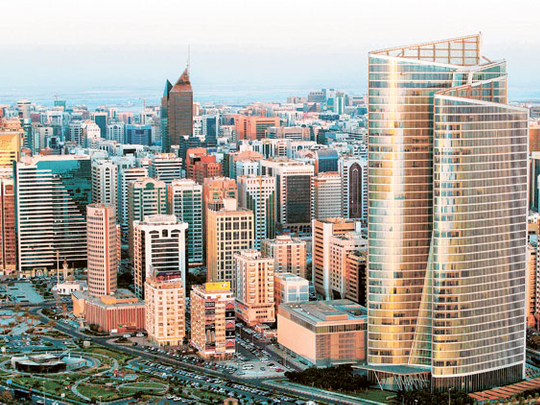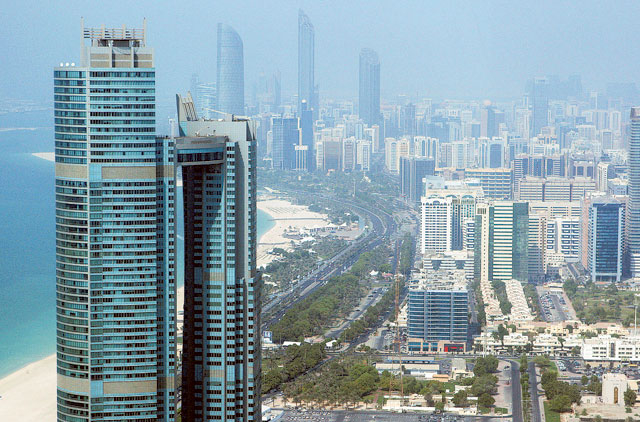
Dubai: Steep cuts in public sector spending as well as job losses could put the lid on investor sentiments in Abu Dhabi’s real estate in the near term.
‘Although average prices have been maintained, sentiment has fallen and transaction volumes have reduced,’ states a third quarter market update issued by the consultancy JLL. “There has also been a tendency for owners to increase leverage and release capital, reflecting increased caution.
‘Further increases to the cost of living (through the removal of utilities and fuel subsidies combined with suggested potential measures to introduce taxes) may further impact future end-user demand.’
This contrasts with the a ‘two-year bull run’ when residential property values grew at 25 per cent annually. But a period of “stabilisation” will be a good thing.
The latest JLL projections reflect the differing dynamics in Dubai and Abu Dhabi’s freehold space. In Dubai, the current soft spell is more about investors - especially overseas ones - getting spooked by currency volatility in Russia, China and, to an extent, India rather than dictated specifically by the local economy or government spending commitments.
Also, there are those prospective buyers waiting for the right bargains to emerge in a down market.
In Abu Dhabi, meanwhile, much derives from the directions in government-related spending. ‘The UAE government plans to cut spending by 4.2 per cent this year, the first such cut for 13 years, leading to job cuts and cost controls in government and delaying the commencement of new mega-projects,’ the JLL report notes.
‘While we expect weaker end-user demand next year, annual supply completions also remain much lower than historic levels.’
According to David Dudley, International Director and Head of Abu Dhabi office at JLL, “For the next two years annual releases have dropped to about 5,000-6,000 units per annum. This is good news given we are currently in a softer period of demand.
“We expect the volume of residential sales to reduce over the short term due to weaker investor sentiment, placing even greater emphasis on rental demand.”
Despite the prevailing conditions, it is interesting then that Aldar Properties has gone ahead with the launch of Dh4 million plus villas forming the West Yas cluster and located close to Yas Mall. More than 1,000 of the four- and five-bedroom residences are being offered.
It would be a good gauge on the level of buying support that exists in the premium space.
Elsewhere in Abu Dhabi city, “A number of towers (are) reaching completion - including residential, office and serviced apartments – on Al Reem Island,” Dudley added.
“However this is a very small percentage of overall planning consents on Al Reem Island. There is scope for more launches provided these are sensibly phased, aligned to end-user demand and again a greater emphasis on rental demand.
“The opportunity at Al Reem Island is to build on the existing clusters such as Shams, Najmat Marina, Marina Square and adjacent to Al Maryah Island and develop integrated sub-communities.”
But developers have to exercise caution... and they seem to be doing so. They are “rightly cautious in the current phase of the cycle and liquidity is tightening,” said Dudley. “That said, there is still scope for additional supply - but the focus needs to be on delivering high quality, well-designed and well-managed real estate, in strong locations.
“Further development needs to be closely aligned to existing, captive end-user demand rather than anticipating major new demand growth. Schemes need to be of a modest scale, allowing flexible phasing to respond to changing market conditions.”
Abu Dhabi’s office property market demand is more stable
Grade A vacancies are “minimal’ within Abu Dhabi’s Grade A buildings, according to JLL. But across the market, vacancy levels inched higher during the third quarter, to 27 per cent, due to new supply delivery. ‘Vacancy rates are expected to increase further with the delivery of more space at a time of weaker demand – although the majority of new office space which has not been pre-committed will be Grade B,’ states the JLL report.
According to David Dudley, Head of the Abu Dhabi office at JLL, “Quality office supply is generally under control. There was a large amount of supply delivered up to 2013, but deliveries have since slowed down and the majority of Grade A space has been absorbed. As for the pipeline, a high proportion of new Grade A is pre-committed, the majority of new speculative supply is Grade B. Accordingly we expect Grade A rents to be upheld, but Grade B rents in peripheral locations to soften.”












